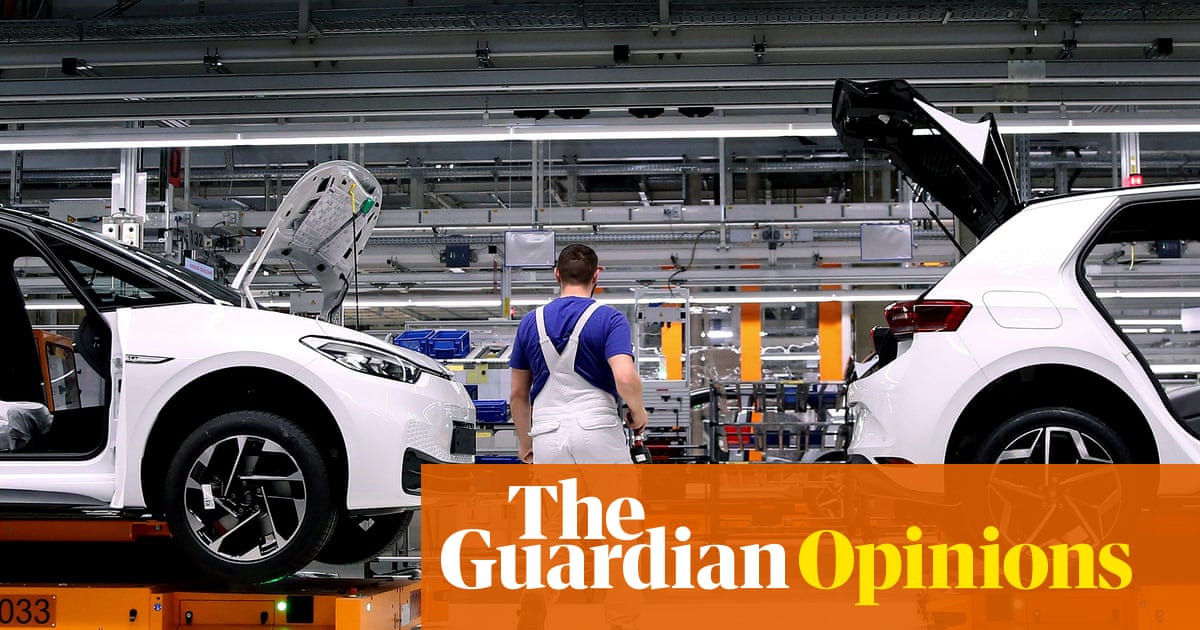Sir Keir Starmer is not the first Labour leader to hanker after a closer relationship between Britain and Germany. Jim Callaghan snuggled up close to the chancellor Helmut Schmidt in the 1970s, and ever since there has been a sense among the social democratic left in the UK that there is much to be learned from Europe’s biggest economy.
The Germans, it has been said repeatedly down the decades, have a superior model of capitalism: based on good design and skilled workmanship; stable, long-term funding arrangements between businesses and the banks; a more consensual system of industrial relations; a network of medium-sized companies, many of them family-owned; a top-notch system of vocational and technical training that ensures a steady supply of skilled, productive workers.
There is a reason Germans work fewer hours and enjoy higher living standards than the Brits: they have rejected Anglo-Saxon capitalism in favour of something better. They run a whopping trade surplus, have sound public finances and keep inflation under control. What’s not to like?
There was a time when that thesis might well have been right on the money. Some of it may still hold true. It is certainly the case that Germany has been able to spend €2tn (£1.7tn) over 30 years levelling up east Germany – a sustained commitment that puts the UK’s effort in the shade.
The brutal truth, though, is that Germany is no longer an appropriate role model for the UK (or indeed, any other country). It is a country where the threat to democracy posed by extremist parties is the result of economic failure. If Britain thinks it has a problem with the far right, then Germany’s problems are of a different order of magnitude. The anti-immigrant party AfD has been leading in the polls before this weekend’s state elections in Saxony and Thuringia. History is in danger of repeating itself.
It is not just that Germany’s recent performance has been poor, although that has certainly been the case. Since 2018, Germany has been the slowest-growing economy in the G7 – expanding by 0.4% a year on average. While the rest of the eurozone’s big four – France, Italy and Spain – have been showing signs of recovering from the slowdown caused by the Ukraine war-induced energy shock, Germany has continued to struggle and is still flirting with technical recession.
To be sure, there are reasons for that. Germany was particularly exposed to the higher cost of gas on global markets triggered by Russia’s invasion in 2022, not least because of its high concentration of energy-intensive industries.
If this were simply the case of a particularly severe cyclical downturn, then there would be little to worry about. Germany has come through plenty of tricky situations in the past, and in the past those who have written it off have been proved wrong.
This time, however, the reasons for Germany’s economic woes go deeper. There are structural causes, the main one being a determination to cling on to the model that has brought it such success but is now past its sell-by date.
Technological change happens in long cycles usually lasting decades. The first wave involved the harnessing of steam power to run the factories that grew up in Britain in the late 18th and 19th centuries. These technologies were eventually superseded by electricity, the internal combustion engine and consumer electronics. These, in turn, are being challenged by the new growth sectors – smartphones, electric vehicles, artificial intelligence (AI). An analogue world is rapidly going digital, and Germany has been painfully slow to realise that.
In a sense, that’s inevitable. Britain was the dominant economic power in the 19th century on the back of the technologies of the first Industrial Revolution and found it hard to break with the old ways even when it should have been obvious that its coal and textile industries were in long-term decline.
As a result, Britain lagged behind its competitors. One of these was Germany, which excelled in advanced manufacturing and precision engineering. Companies such as Volkswagen and BMW made big profits in the golden age of the petrol and diesel-fuelled car.
after newsletter promotion
In a sense, Germany became the victim of its own success. It saw no reason to change the model and invested too little in physical, human and digital infrastructure. There are many fascinating facts in Wolfgang Münchau’s compelling new book about the end of the German economic miracle – Kaput – due out this autumn. One is that the UK now has a larger proportion of students studying a Stem subject – science, technology, engineering and maths – than Germany. Another is that Germany is nowhere when it comes to exploiting the possibilities of AI. The US and the UK have 5.22 AI startups for each 100,000 inhabitants; Germany has 1.9.
Nor has Germany lived up to its reputation for long-termism when it comes to the transition to electric vehicles. On the contrary, the big car companies were woefully shortsighted when meeting the existential threat posed by low-cost Chinese models.
The US is the prime example of a country that has moved with the times and has been able to adapt its industrial structure to changing circumstances. As Münchau puts it: “The German super-cycle is ending; that of the US is still going strong.”
So, yes, the UK under-invests and needs to find a way of being at the cutting edge of the fourth Industrial Revolution. But so, too, does Germany, a country long overdue the creative destruction that would allow new ideas and new products to flourish.
And, yes, Britain has lessons to learn from other countries. Yet not many of them will come from Germany, increasingly an analogue economy in a digital world.

